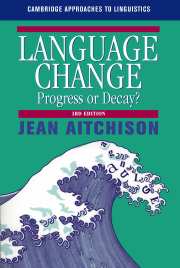3 - Charting the changes
Studying changes in progress
from Part 1 - Preliminaries
Summary
The crisis consists precisely in the fact that the old is dying and the new cannot be born; in this interregnum a great variety of morbid symptoms appear.
Antonio Gramsci, Prison notebooksUntil relatively recently, the majority of linguists were convinced that language change was unobservable, Most of them simply accepted that it happened, but could never be pinpointed. A popular assumption was that language change was a continuous but very slow process, like the rotation of the earth, or the creeping up of wrinkles, or the opening of flowers. It happened so slowly and over so many decades that it was quite impossible to detect its occurrence. You could only look at it beforehand and afterwards, and realize it had happened, just as you might glance at a watch at four o'clock, and then at ten past four. You could note that ten minutes had passed by, but you would probably not have seen the hands actually moving. Leonard Bloomfield, sometimes called ‘the father of American linguistics’, stated in 1933 that ‘the process of linguistic change has never been directly observed – we shall see that such observation, with our present facilities, is inconceivable’. As recently as 1958, another influential American linguist, Charles Hockett, claimed that ‘No one has yet observed sound change; we have only been able to detect it via its consequences … A more nearly direct observation would be theoretically possible, if impractical, but any ostensible report of such an observation so far must be discredited.’
- Type
- Chapter
- Information
- Language ChangeProgress or Decay?, pp. 37 - 52Publisher: Cambridge University PressPrint publication year: 2000



